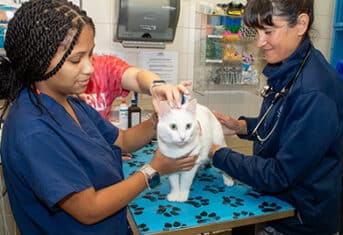Everyday Medicine: Is it Vomiting or Regurgitation?

Everyday Medicine: Is it Vomiting or Regurgitation?
“Everyday Medicine” is an intermittent series of blog posts highlighting tests, treatments, and procedures common in daily Animal Medical Center practice. Some past examples of this type of blog post include “Cytology” and “Packed Cell Volume.” Today’s post focuses on the question: Is it vomiting or regurgitation?
Veterinarians Ask a Lot of Questions
The first part of any patient visit to the veterinarian is a Q&A called history taking. We ask the pet family questions about their pet’s health. You know the drill – How is his appetite? Do you send him to the boarding kennel? Do you have other pets? We adapt the questions to the situation. In the animal ER, the Q&A will be truncated and may only be, “Where did he get hit by the car?” rather than a lengthy set of questions about diet and exercise. In dogs or cats with vomiting, we often probe further to differentiate vomiting from regurgitation.
Vomiting
You know the sound of vomiting. First you hear a horrible gagging sound right before you find the big spot on the carpet. Always on the carpet because no self-respecting pet would vomit on the linoleum where clean-up is easy. Vomiting is an active process and you see contraction of the abdominal muscles a split second before the stomach empties.
Regurgitation
Until I went to veterinary school, I thought regurgitation was a more sophisticated word for vomiting. Not true. Regurgitation does not have the forceful expulsion of food from the stomach typical of vomiting. The food seems to fall out of the mouth rather than exploding from the stomach. Regurgitated food never makes it to the stomach because of poor esophageal function, and if undigested food seems to fall out of your pet’s mouth, he may be regurgitating. Regurgitation is much less common than vomiting and is associated with a disorder called megaesophagus.
Does the Answer Matter?
The short answer is yes. If a veterinarian can determine a patient is regurgitating rather than vomiting, then she will follow a different path of diagnostic testing. If your veterinarian suspects vomiting, an abdominal x-ray is commonly obtained. Because regurgitation suggests esophageal dysfunction, a chest x-ray will be part of the initial testing to see if the esophagus appears abnormally filled with air. Special movie x-rays called fluoroscopy can be used to identify esophageal dysfunction typical of megaesophagus.
To learn more about megaesophagus, watch this video interview by Insider.































